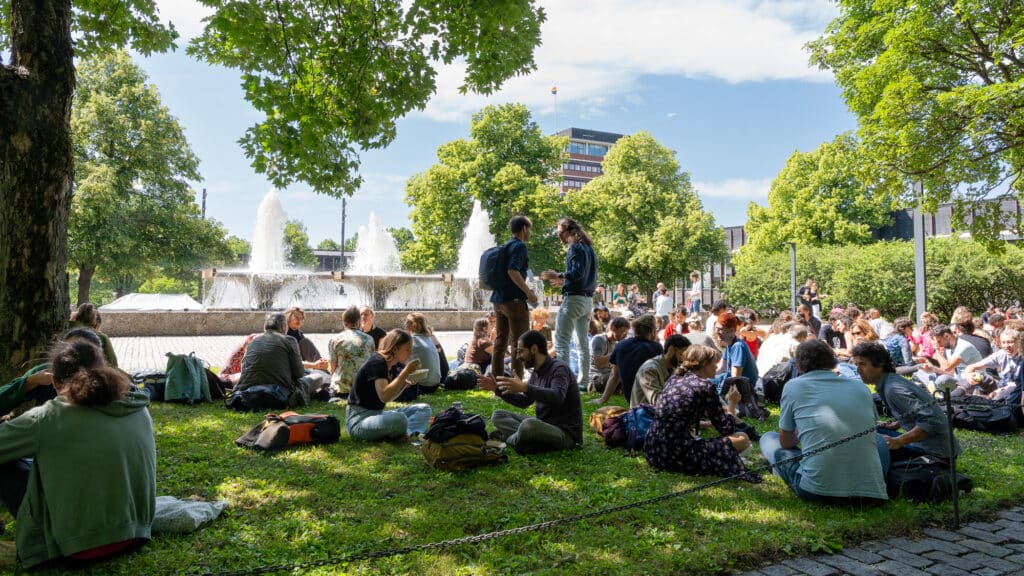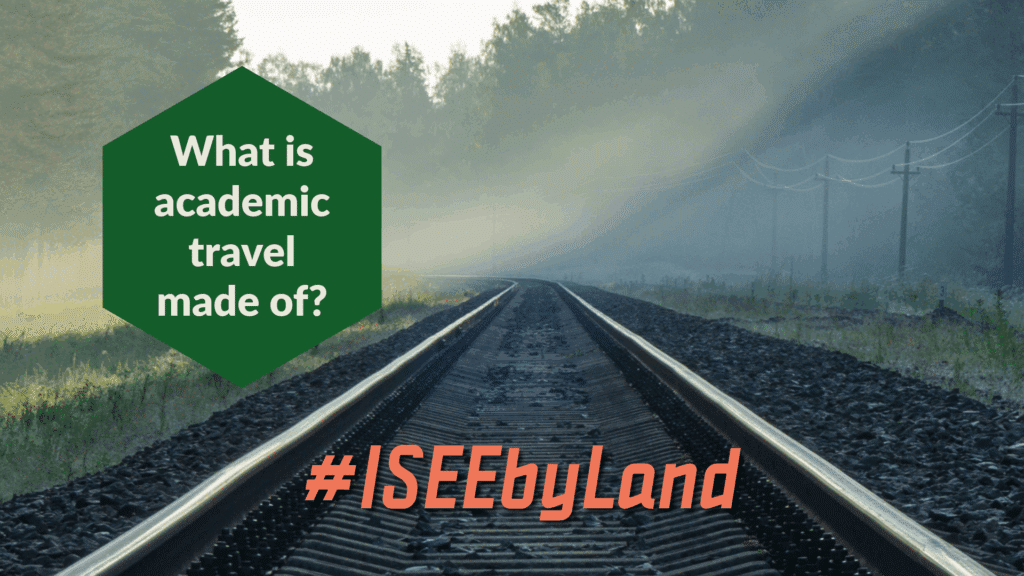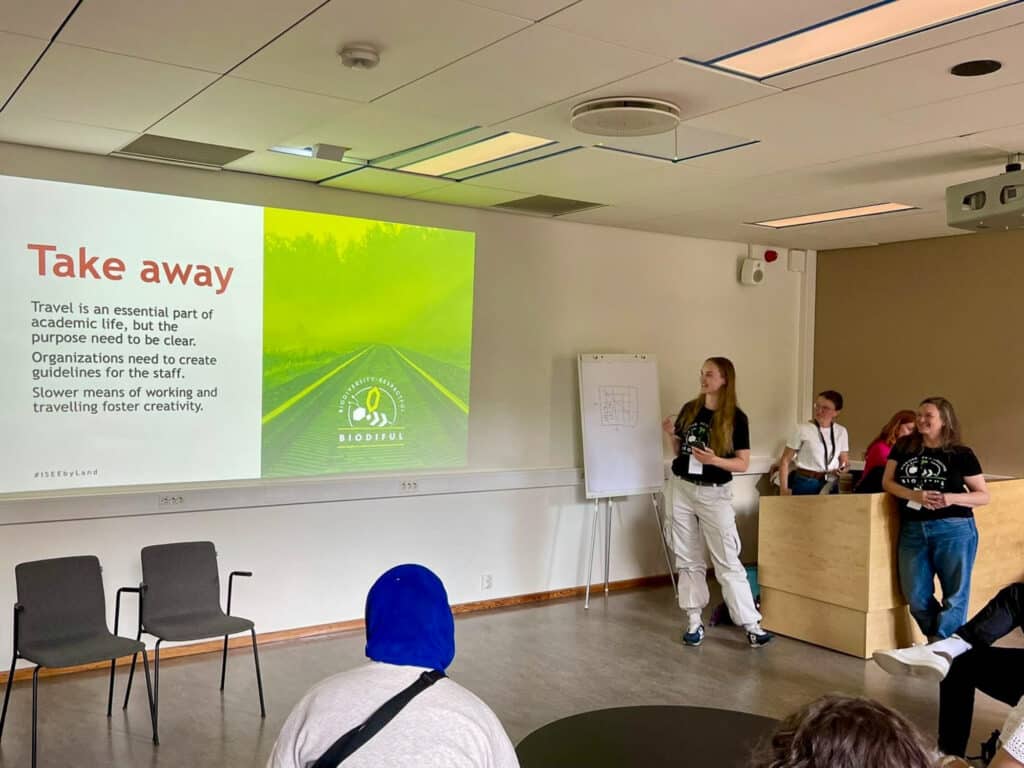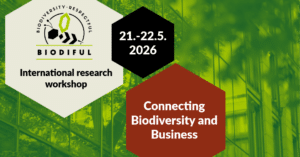That’s a wrap! Hanna Oksanen and Lumi Aalto-Setälä from the BIODIFUL consortium completed their journey by ferry and train from Turku, Finland to Oslo, Norway to attend the ISEE-Degrowth 2025 conference. Hanna and Lumi conducted an interview video project on academic travel and opportunities for green mobility. The series of videos took a look at the various aspects of academic travel examining institutional policies, personal responsibilities, and planetary limits.
We thank the organizers of the 18th International Society for Ecological Economics and the 11th International Degrowth Conference for their dedication to exploring socially just post-growth futures and effectively linking theory with action. Let’s delve into some reflections from our colleagues and summarize our key findings from the video project “What is academic travel made of?” You can watch all the episodes on BIODIFUL’s Instagram page.
Highlights from colleagues
As our colleague Maria Pecoraro highlighted in her LinkedIn post (in Finnish), the conference reminded us of many important issues:
- Justice is at the core of sustainability transition, both in how we treat nature and how we treat each other. A true green transition should not force countries in the Global South to pay a price that harms their environments and future prospects.
- Sustainability shouldn't just be about individual choices in Europe. We need to value different perspectives and show empathy and respect for various countries and cultures. It's important to understand that our way isn't the only way. We need to think about fairness in the system, take responsibility for history, and consider views from the Global South.
- We should increase solidarity, reduce privilege-based selfishness, and bravely support the vulnerable, marginalized, and colonized people. It's time to move from just talking to doing more through concrete actions, making decisions, and listening to people at every level of society.

A key highlight of the conference was the blending of activism and academic research. Our colleagues, Milla Unkila and Outi Uusitalo, shared valuable insights on why this integration is crucial for environmental studies.
Milla Unkila highlights that activism and research are equally important and should support each other. Milla also points out a big problem: too often, these groups work in isolation. Events that bring together people from different backgrounds but with the same goals are extremely valuable.
Outi Uusitalo enjoyed how the conference combined activism with research, stressing that this wasn’t about creating sides but integrating strengths. “Challenging researchers to engage in action is central in the field of study,” she notes. Outi appreciated the variety of viewpoints and the deep discussions that took place, finding them both inspiring and enlightening.

Our project on academic mobility and green travel
After wrapping up our social media campaign on academic mobility and green travel, it’s time to unpack both our backpacks and the insights from our project. Let’s first dive into some essential background statistics about academic air travel and its significant environmental impacts.
Academic air mobility is responsible for nearly half of the emissions from higher education institutions in Finland. Veronica Ahonen’s dissertation revealed that over half of these trips were either indirect, within Europe, or lasted less than three days. These findings highlight substantial opportunities for adopting more environmentally friendly travel practices, often hindered by institutional limitations, geographical challenges in Finland, and budget constraints.
As we delve deeper into sustainable practices within our own university, the impact rankings and emissions data serve as indicators of current standings and areas needing attention. In the Times Higher Education Impact Rankings, Finnish universities show varying degrees of success in embedding sustainability into their operations. Notably, the University of Turku and the University of Jyväskylä are ranked within the 401-600 bracket, reflecting room for enhancements in their sustainability policies. UTU’s results highlighted weaknesses in sustainable transport despite the university’s overall strong performance. LUT University stands in the top 101-200, showcasing stronger performance in sustainability initiatives.
Turning to specific emissions data from the University of Turku reveals that the university’s business travel generates a significant environmental impact, accounting for 44% of its total emissions. This statistic highlights the crucial role that refining travel policies can play in reducing the university’s overall carbon footprint of 8430 tons of CO2 equivalent in 2024.
The University of Turku total emissions from 2024 and emission categories.
www.utu.fi/en/university/sustainability-and-responsibility/environmental-footprint
Communicating degrowth in consumerist cultures
Our project was part of a special session in the conference “Bridging Theory and Practice: Communicating Degrowth and Postgrowth in Consumerist Cultures”.
In the session we uncovered perspectives on communicating degrowth in the UK and Germany for example, and shed light on innovative approaches to connect the theoretical findings of degrowth with practical applications. Whether it’s leveraging dance improvisation to bridge theoretical and practical realms or unraveling the complexities linked to ‘money trauma,’ these discussions proved that transformative change in consumerist cultures requires creativity and broadened thinking. Dialogue is critical for successfully communicating in consumerist cultures. Effective communication must happen where the audience is culturally and linguistically.

The primary objective of our own project was to test sustainable travel practices that individuals and organizations can adopt. Recognizing the power of effective communication, we aimed to transform the narratives around professional mobility. To achieve this, we launched a social media campaign designed to engage and educate a broad audience on these issues.
We produced a total of 10 videos focusing on different aspects of sustainable academic travel.
- Introduction of ourselves and the project.
- Interview with Jutta Mäkinen, a specialist in sustainable development at the University of Turku. Are there any policies or goals related to work travel and emissions? What kind of changes would make sustainable travel easier for university staff?
- Interview with Esko Sorakunnas, postdoctoral researcher at the Biodiversity Unit, about the role of academic flying. What drives our travel decisions? What alternatives do we have?
- Interview with professor Ilari Sääksjärvi, director of the Biodiversity Unit and the BIODIFUL project at the University of Turku. How to balance urgency and sustainability when traveling for work?
- Interview with Satu Teerikangas, professor of management and organization at the Turku School of Economics and co-leader of the BIODIFUL consortium. Can slower ways of working or traveling support better thinking or collaboration?
- Interview with Juulia Räikkönen, University Research Fellow at the Biodiversity Unit. How can we design academic travel in ways that support both people and the planet? How can biodiversity and tourism in general support each other?
- Interview with Juha Hiedanpää, research professor at the Natural Resources Institute Finland (LUKE). How do organizations support sustainable travel? What is difficult about this change for institutions?
- Traveling by the Baltic Sea.
- Interview in the train with fellow conference travelers Maria Pecoraro and Outi Uusitalo from the University of Jyväskylä.
- Interview with Esko Sorakunnas, postdoctoral researcher at the Biodiversity Unit, discussing hotel certificates and underlying reasons to travel. In addition we show some easy individual swaps to respect the environment.
Key insights on green academic travel
What is the purpose of the travel?
Travel is an integral part of academic life, but its justification needs to be clear and strong. We must assess whether each trip is truly necessary or if virtual alternatives could achieve the same objectives, thus reducing environmental impact.
What are the guidelines for work-related travel?
There is an urgent need for clear, actionable guidelines to help academics make well-informed travel decisions that align with sustainability principles. Institutions like the University of Turku continuously refine these guidelines to support the reduction of carbon emissions.
What are the guidelines for work-related travel?
Contrary to traditional fast-paced approaches, our findings show that adopting slower modes of work and travel not only lowers carbon footprints but also boosts creativity among academics. This shift challenges the usual rush associated with academic productivity, promoting a more balanced approach that emphasizes both quality and sustainability.

Watch the final conclusion video!
We invite you to watch all of our previous videos and the summary of our findings, hoping they inspire further reflection and action towards green academic travel.
Thank you for joining us on this journey!
Lumi & Hanna
Hanna Oksanen and Lumi Aalto-Setälä are working in the BIODIFUL consortium’s interaction and communication team. Hanna Oksanen is a photographer and a graphic designer and Lumi Aalto-Setälä is a doctoral student at Turku School of Economics



